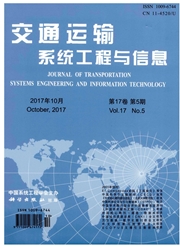

 中文摘要:
中文摘要:
随着城市快速路交通信息采集系统的发展,特别是视频车牌采集系统的应用,使实时动态获得快速路行程时间成为可能,同时也促进了高精度行程时间预测的理论研究和实际应用需求.本文基于快速路车牌识别数据检测的海量历史时间序列数据,选择预测时段的前4个时段的数据作为输入特征值,以遗传算法建立模型参数优化算法,得到训练模型及其参数,从而实现车辆行程时间的动态预测.最后以上海市快速路系统中的三个典型路段的实测数据进行实例分析.结果表明:与传统的指数平滑法、多元回归法、ARIMA法预测结果对比,基于SVM的预测路段平均绝对百分误差在5%以内,希尔不等系数非常接近0,SVM模型显示了更高的预测精度.
 英文摘要:
英文摘要:
With the development of the Urban Expressway Traffic Information Collection System,in particular,the development of video license plate capture system,it is possible to access real-time dynamic expressway travel time,and at the same time,the demand of theoretical research and practical applications of high accuracy travel time prediction is raised.Based on mass of historical time series data detected by license plate recognition system on expressway,four periods of data before forecast period are selected as the input features.In order to achieve dynamic travel time prediction,support vector regression machine is adopted,and model parameters optimization algorithm is created,then trained model is gotten.Finally,three typical sections from Shanghai expressway systems are chosen and the SVM model is used.Compared with the traditional exponential smoothing method,the multiple regression method and the ARIMA method,the mean abs.percent error of SVM model is under 5% and Theil inequality coefficient is very close to 0.It can be seen that the SVM model in this article shows higher prediction accuracy.
 同期刊论文项目
同期刊论文项目
 同项目期刊论文
同项目期刊论文
 Simulation framework for Vehicle platoon and car-following behaviors Under Connected-Vehicle Environ
Simulation framework for Vehicle platoon and car-following behaviors Under Connected-Vehicle Environ 期刊信息
期刊信息
